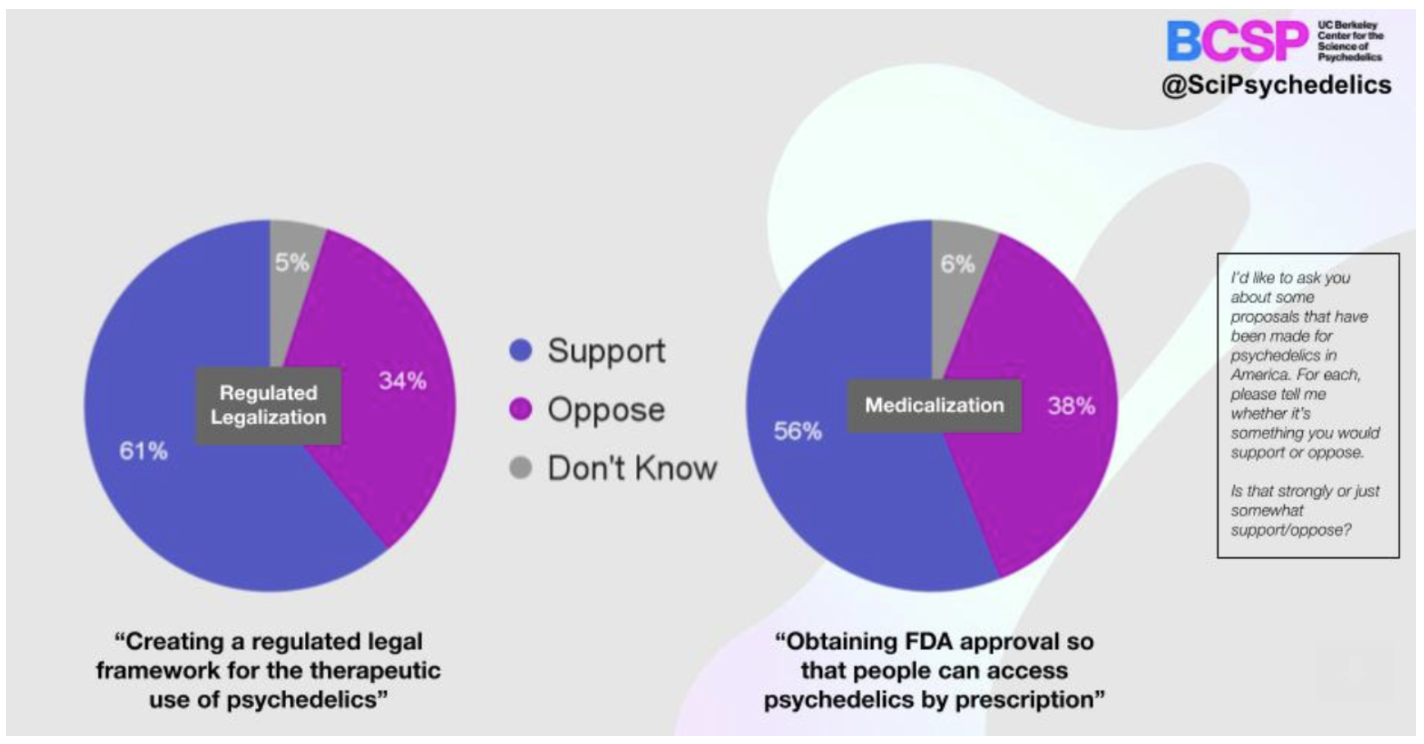Three Things To Read This Weekend
1. New UC-Berkeley Poll Finds 61% Support for Regulated Access to Therapeutic Use of Psychedelics.
The UC Berkeley Center for the Science of Psychedelics released the first of what will be a long-term tracking poll of public attitudes towards psychedelic medicine and treatment. As the researchers explain, here are the top findings from the survey:
“More than six out of ten (61 percent) American registered voters support legalizing regulated therapeutic access to psychedelics, including 35 percent who report “strong” support.”
“More than three-quarters of voters (78 percent) support making it easier for researchers to study psychedelic substances.”
“Almost half (49 percent) support removing criminal penalties for personal use and possession.”
These results largely track a March 2023 poll from Breakthrough Bulletin, which found:
“Most voters (60%) support changing the law to give adults access to regulated psychedelic treatment. Net support for expanded access for adults stands at +55 for Democrats; +36 for Independents; and + 18 for Republicans.”
After exposure to opposition messaging— “these substances are known to cause people to hallucinate and enter an altered state of reality, which can be dangerous—both to the person receiving the treatment and those who administer it” —voter support for regulated access to psychedelic therapy remained robust at 58%.
A majority of voters—53 percent—support changing federal law to remove criminal penalties for possession of psychedelic substances. Just 29% of voters oppose the law change. That means net support for removing criminal penalties at the federal level sits at +24. Notably, this includes majority support from Democrats and Independents and plurality support from Republicans.
2. Politico On “Psychedelics For Soldiers”
Dan Crenshaw, a Republican Congressman from Texas, lost an eye in an IED explosion while he was deployed as a Navy SEAL in Afghanistan. Crenshaw is also one of the most ardent advocates for tackling the nation’s veteran suicide crisis. And, in a surprise to some of his colleagues, that mission has positioned him as a leading voice in the effort to expand research on and access to psychedelic medicine and treatment.
For Politico, Erin Schumaker, Ben Leonard, Carmen Paun, detail Crenshaw’s current effort to add an amendment to the National Defense Authorization Act, which he announced last week as he “stood beside a photo of Douglas ‘Mike’ Day, the Navy SEAL his amendment is named after, who died by suicide earlier this year.” Here’s more from Politico:
“The amendment would allow active service members with certain conditions, such as post-traumatic stress disorder and traumatic brain injury, to participate in clinical trials of MDMA, psilocybin, ibogaine and DMT, regardless of how those drugs are regulated. Service members would no longer risk being kicked out of the military for participating. ‘We need to study this innovative therapy and give our service members a chance to continue that service when they are treated. They deserve that option, and we should not stand in their way.’ [Crenshaw said.]”
Related: The U.S. Food and Drug Administration issued its first draft guidance to “advise researchers on study design and other considerations as they develop medications that contain psychedelics.” Writing for Axios, Oriana González and Sabrina Moreno report that the move “creates a path for psychedelic drug trials” that could “encourage the mainstreaming of [psychedelic] substances … as behavioral health treatments.”
3. “Psilocybin significantly decreased symptoms of OCD after 8 weeks.”
A small pre-publication study from researchers at the University of Arizona found that psilocybin reduced symptoms of obsessive-compulsive disorder more effectively than Lorazapem, a benzodiazepine standardly prescribed to patients struggling with the disorder. Researchers have found that OCD affects as many as 150 million people globally. Frustratingly, because “at least a third of patients with OCD do not respond to first-line treatments. There is a clear need for therapeutic alternatives.”
Here’s Robert Herpen with more details in Healio:
“Their study included 15 participants with severe OCD who had limited previous experience with psychedelics. A screening period introduced the Yale-Brown Obsessive Compulsive Scale (Y-BOCS), which rated severity of OCD symptoms in participants ahead of the initial study phase with participants randomized to receive either 100 micrograms per kg of psilocybin, 300 micrograms/kg or 1 mg lorazepam for 4 weeks. The second phase involved administering the high dose of 300 micrograms/kg to all participants for weeks 5 through 8 before a follow-up at 6 months.
Results showed that psilocybin significantly reduced symptoms of OCD compared with lorazepam at week 4, while Y-BOCS scores were significantly reduced from baseline at week 8. One week after the final dosing session, 80% of participants responded with symptom reduction of 25% or more from baseline, while 40% were remitted. Researchers found that after 6 months, 20% of participants remained in remission, and 66.7% demonstrated symptom reduction of 25% or more with a causal relationship between number of doses and symptom reduction.
Psilocybin was well-tolerated, with no increase in suicidality or emergence of psychotic symptoms in the patient population. No severe adverse events were observed, with no observable difference among the three treatment groups with regard to minimal, mild or moderate adverse events, Allen and colleagues wrote.”
Related: The University of Arizona study involved a small sample size, but its promising results could be corroborated through a new study from Yale Medicine. Dr. Benjamin Kelmendi is leading the first “double-blind, placebo-controlled study” on the “efficacy of psilocybin in OCD.” The aim of the ongoing study is to “investigate the effects of oral psilocybin on OCD symptomatology and provide the first evidence of the neural mechanism that may mediate psilocybin's purported therapeutic effects on OCD.”

